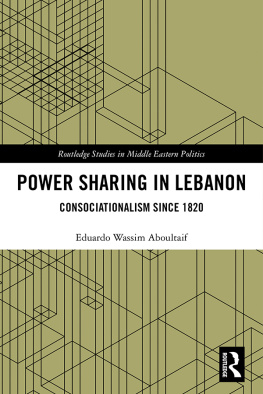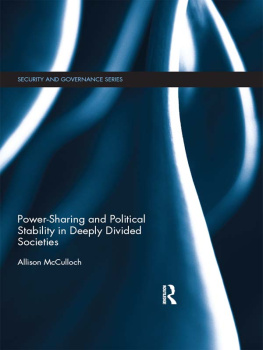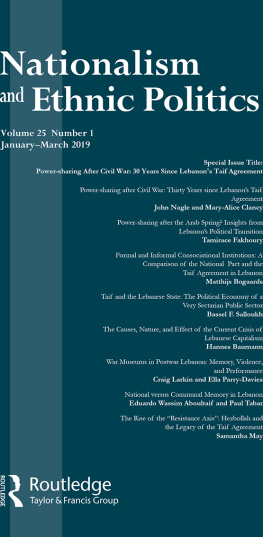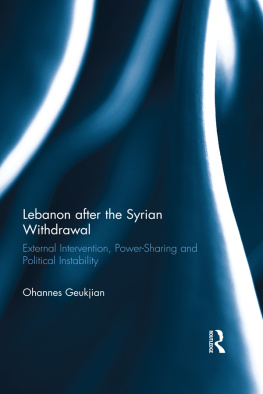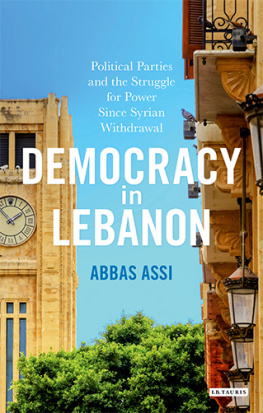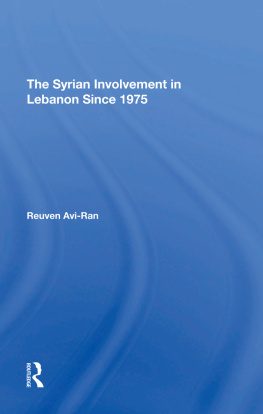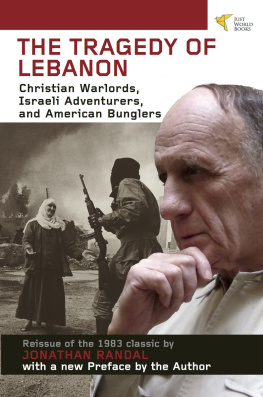Power Sharing in Lebanon
This book studies the origins and evolution of power sharing in Lebanon. The author has established a relationship between mobilization, ethnurgy (ethnic identification), memory and trauma, and how they impact power sharing provisions.
The book starts with the events in the 1820s, when communities began to politicize their identities, and which led to the first major outbreak of civil violence between the Druze and the Maronites. Consequently, these troubled four decades in Lebanon led to the introduction of various forms of power-sharing arrangements to establish peace. The political systems introduced in Lebanon are: the Kaim-Makamiya (dual sub-governorship), a quasi-federal arrangement; the Mutassarifiya, the prototype of a power-sharing system; the post-independence political system of Lebanon which the book refers to as semi-consociation, due to the concentration of executive powers in the Presidential office; and finally, the full consociation of the Taif Republic. In each of these phases, there was a peculiar interaction between the non-structural elements that had a direct impact on power sharing; this led at times to instability, and at other times it brought down the system, as in 18401860 and 1975.
Power Sharing in Lebanon is the first academic work that emphasizes the influence of the non-structural elements that hinder power sharing. This volume is now a key resource for students and academics interested in Lebanese Politics and the Middle East.
Eduardo Wassim Aboultaif holds a PhD in Politics from the University of Otago, New Zealand. He studies power sharing in deeply divided societies, Middle East Politics, and mobilization, memory and trauma. His work has been published in Nations and Nationalism, the Arab Studies Quarterly, the Journal of Muslim Minority, the Journal of Borderland Studies, and the Royal United Service Institute Journal.
Routledge Studies in Middle Eastern Politics
Minority Rights in Turkey
Gzde Yilmaz
Municipal Politics in Turkey
Charlotte Joppien
Politics and Gender Identity in Turkey
Umut Korkut and Hande Eslen-Ziya
Israels Foreign Policy Beyond the Arab World
Jean-Loup Samaan
Party Politics in Turkey
Edited by Sabri Sayari, Pelin Ayan Musil and zhan Demirkol
The Religionization of Israeli Society
Yoav Peled and Horit Herman Peled
Participation Culture in the Gulf
Networks, Politics and Identity
Edited by Nele Lenze and Charlotte Schriwer
Patterns of Nationhood and Saving the State in Turkey
Ottomanism, Nationalism and Multiculturalism
Serhun Al
Power Sharing in Lebanon
Consociationalism Since 1820
Eduardo Wassim Aboultaif
For a full list of titles in the series: www.routledge.com/middleeaststudies/series/SE0823
Power Sharing in Lebanon
Consociationalism Since 1820
Eduardo Wassim Aboultaif
First published 2019
by Routledge
2 Park Square, Milton Park, Abingdon, Oxon OX14 4RN
and by Routledge
52 Vanderbilt Avenue, New York, NY 10017
Routledge is an imprint of the Taylor & Francis Group, an informa business
2019 Eduardo Wassim Aboultaif
The right of Eduardo Wassim Aboultaif to be identified as author of this work has been asserted by him in accordance with sections 77 and 78 of the Copyright, Designs and Patents Act 1988.
All rights reserved. No part of this book may be reprinted or reproduced or utilized in any form or by any electronic, mechanical, or other means, now known or hereafter invented, including photocopying and recording, or in any information storage or retrieval system, without permission in writing from the publishers.
Trademark notice: Product or corporate names may be trademarks or registered trademarks, and are used only for identification and explanation without intent to infringe.
British Library Cataloguing-in-Publication Data
A catalogue record for this book is available from the British Library
Library of Congress Cataloging-in-Publication Data
A catalog record has been requested for this book
ISBN: 978-1-138-32935-5 (hbk)
ISBN: 978-0-429-44822-5 (ebk)
Typeset in Times New Roman
by Wearset Ltd, Boldon, Tyne and Wear
This book is dedicated to the loving memory of Sami Makarem, a beam of light in the darkness of my days.
And I Dip Knowledge from His Sea of Wisdom.
Sheikh Jamal ad-Din Abdullah at-Tannukhi
Contents
I am grateful and forever indebted to William Harris, who has shown relentless guidance for my book and academic work. He has never been impartial or uninterested in my tiring demands to improve the quality of this book, nor has he ever failed to provide me with the best advice for my work. There are no words that can explain my gratitude to Bill, at both the personal and academic level, for he always treated me as a son and an academic student. I have learned a lot from him, and I wish to follow his example in academic inquiry. I am thankful as well to James Headley, who has encouraged me to look at similar examples to Lebanon, and has provided guidance for my theoretical and empirical analysis.
A special thanks goes to Afife Skaifi Harris, Bills wife, a Lebanese who became a New Zealander but who never forgot her origins. Afife is a typical example of a Lebanese migrant who always tends to show the best of their culture. Indeed, Afife reminded me how non-sectarian and liberal a Lebanese could be; despite our different religious and cultural backgrounds, Afife has always insisted in taking care of me from the moment I set foot in the airport in New Zealand, always endorsing me as a family member. I have learned a lot from Afife, especially as a successful example of how a foreigner can adapt to new cultural values, without giving away their indigenous ones. I will always remember her altruistic values and her never-ending quest to contribute to New Zealand and Lebanon. I am also grateful to her son Chris Latief Harris, who never tires of showing new people around Dunedin: he is indeed a wonderful friend.
During the course of writing, I have managed to meet with Professor Arend Lijphart, the father of consociational literature and philosophy. Lijphart is a retired political scientist whose contribution to politics in deeply divided societies has enormous impact on conflict resolution and management. He was kind enough to give me substantial time in the meeting we had in San Francisco, as well as the emails exchanged over the last couple of years. I wish him the best of health and fortune, for Lijphart, despite the heavy criticism he received on consociationalism, never failed to reply to his critics in a gentle and professional style. Professor Theodor Hanf, an authority on Lebanese politics, has also given me magisterial guidance regarding my work: I am thankful for the time we spent together in Beirut discussing and arguing about Lebanese affairs. Hanf is a very wise academic whose work has had an important impact on political science. Professor Chibli Mallat was kind enough to meet with me and discuss important details about his presidential campaign and the events following Hariris assassination. It was an honour to meet with this international lawyer and intellectual, and I wish to see him as an MP or a minister in the future, to improve the situation of the country. I am also greatly indebted for our long talks to Michael Young, a distinguished journalist and researcher of incredible eminence and charm. Michael has been extremely helpful in providing valuable insights for my analysis of the Lebanese predicament.

